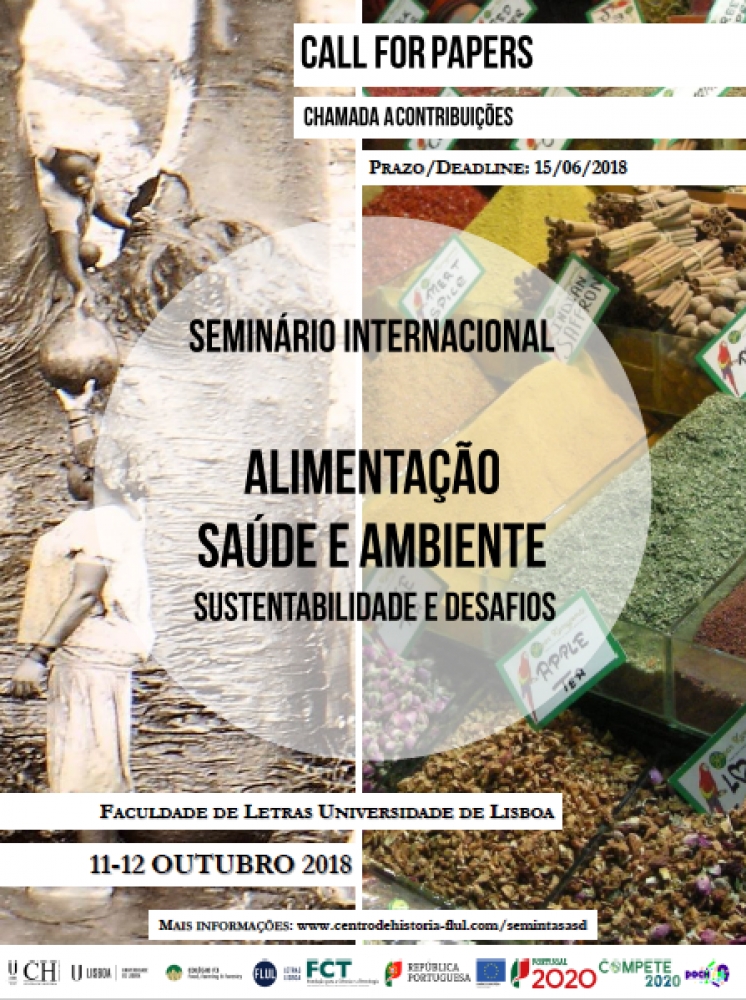CfP (deadline: 15/06/2018): INTERNATIONAL SEMINAR FOOD, HEALTH AND ENVIRONMENT: SUSTENTABILITY AND CHALLENGES (CH- ULisboa. FLUL, Anfiteatro III, 11-12 october 2018)
- Written by REPORT(H)A
- Published in News
The Centro de História da Faculdade de Letras da Universidade de Lisboa (CH-FLUL) co-organizes and welcomes the International Seminar Food, Health and Environment: Sustainability and Challenges, which will take place in October 2018. This seminar stresses the beginning of the scientific agenda of the Working Group on Transições Tecnológicas: Memórias, Saberes e Práticas created within the scope of the Colégio F3.
The relationship between food, health and environment unequivocally expresses the basic relationship between humans and nature. Privileging a multidisciplinary approach this meeting intends to be a forum for discussion on the basic issues of the everyday life of the human communities related to food, health and well-being in their relationship with the environment considering, on the one hand, a perspective of historical analysis that includes geographical, cultural and technological diversity and, on the other, the current challenges facing globalization and the scarcity of resources, as well as the overexploitation of these and the technological innovations to overcome the difficulties and / or negative consequences of this exploitation.
Over the centuries, life and human development depended on the relation man / nature and on the strategies used to take advantage of natural resources. Appropriation and domestication of nature was progressive, encompassing coppice strategies to provide firewood as well as hunting and collecting of plants and herbs for food and medical purposes prior to the development of herding, farming and grazing practices and the subsequent techniques designed to ensure their effectiveness.
The increase in population, the need to organize and manage rural and urban spaces and the process of industrialization have introduced factors of imbalance in this relationship. Subsequently, imperial and colonial contexts have turned it into an enabler of segregation and social inequalities, with direct implications for access to essential goods and services while committing rights now considered fundamental.
Over time, this relationship became a privileged space where knowledge, technique, science and power meet, reflecting pathways marked by innovations, adaptations and profound changes, due to human curiosity, needs and economic and political interests, as well as to environmental changes, which condition or result from them. All of them contributing to shaping and configuring the world as we know it today. A world in which most countries are overusing resources to meet people's basic needs, making it increasingly necessary to find alternatives for a rational and sustained use of the planet’s resources.
In this context, by incorporating the component of memories, traditional knowledge and practices it is also intended to draw attention to the importance of archives and the interdisciplinary recovery of historical information as well as to its contribution to rethinking actions and behaviors in order to help solve or minimize some of the current problems and contribute to an Intelligent Future.
Therefore, special attention will be given to the different solutions found by the communities over time and in accordance with the specific situations that each one had (has) to face, regarding to water and sanitation, the irrigation and distribution of food species, the organization and management of rural areas and urban spaces or the relation between food and health, aiming at stimulate also the discussion on technologies, sustainability and human rights.
The association of the Overseas Historical Archive (AHU) to this meeting will allow the presentation of an exhibition of archival documents related to the conference topics, to be visited during the event.
Potential but not exclusive topics:
- Water: traditional technologies of management, storage and distribution
- Food and health: sustainable food consumption
- Climate change: impacts on health, production and consumption of food; Impacts on the landscape and the way of life of the populations
- Demography, urban concentration and rural depopulation: social and economic constraints and impacts
- Metropolis, empires and colonies: geographical spaces and economic policy strategies in a compared perspective
- Organization and use of historical information on food, health and environment
- Cultural and social responses: civil society, involvement and participation
- Health and disease: environment and health policies, sanitation, epidemics...
- Other topics
Submission of abstracts:
Proposals should be sent by June 15, 2018, through the form available at: http://www.centrodehistoria-flul.com/semintasasd#Form
Approved proposals can be presented as posters (10 minutes) or oral presentations (20 minutes), in Portuguese or in English, although simultaneous translation is not possible.
Oficial language:
Portuguese and English
Main deadlines:
Reception of abstracts: 30 March – 15 June 2018
Notification of acceptance: 1 July 2018
Confirmation/Registration: 15 July – 1 September
Provisional Program: 1 October 2018
For more information please contact This email address is being protected from spambots. You need JavaScript enabled to view it.

